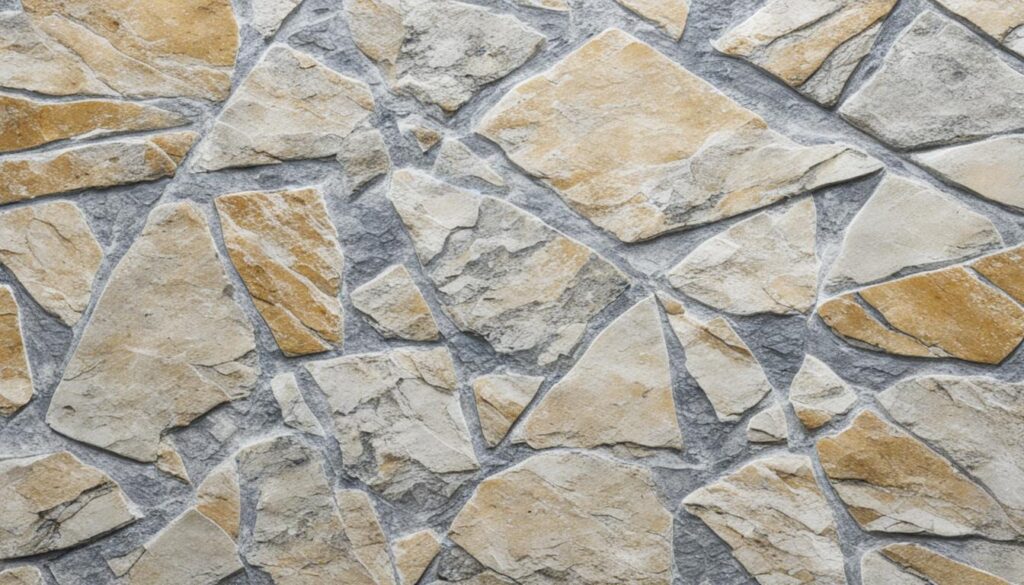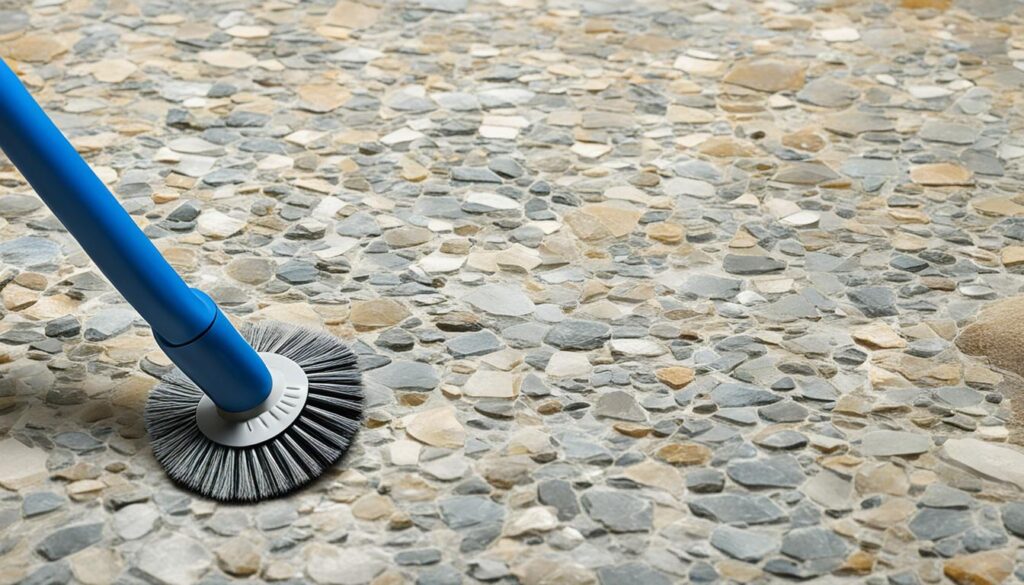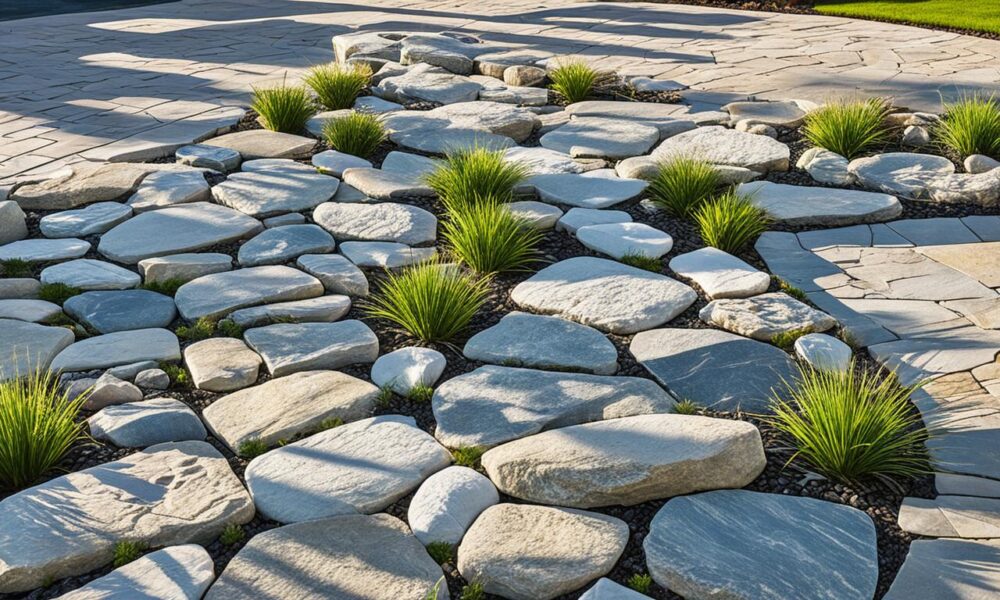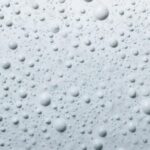Natural Stone Maintenance: Avoid Common Errors
Keeping natural stone in great shape is key to its beauty and life span. Sadly, many owners unintentionally harm their stone floors or counters. They use the wrong cleaners, like acid or harsh chemicals. These can cause etching, especially on marble. Marble is very sensitive to acid, which is in things like cola, lemon, and vinegar1. It’s wise to follow expert advice, such as that from Cosmos SurfacesTM, to care for stone properly.
To avoid errors, use stone-friendly, non-acidic cleaners or simple dish soap and warm water. Walking on stone wears it down, revealing tiny holes that need deep cleaning2. Sealing your stone floor also makes it easy to care for many years. It keeps looking luxurious2. By using these care tips, your stone surfaces will stay beautiful and last longer.
Key Takeaways
- Use non-acidic, stone-specific cleaners for upkeep1.
- Steer clear of strong alkaline and acidic cleaners to avoid marble etching1.
- Sealing and cleaning regularly prolongs stone’s life2.
- Everyday items like cola, lemon damage stones made of calcium carbonate1.
- Regular care keeps the beauty of stone surfaces intact.
Understanding the Importance of Proper Stone Maintenance
To keep natural stone looking great and durable, it’s critical to know how to care for it properly. One must act fast on spills and use the right cleaners. Otherwise, stains and damage that can’t be fixed may occur.
Why Proper Maintenance Matters
Without regular cleaning, stone surfaces can collect dirt, making them look dull and possibly become unclean3. You must quickly deal with spills to avoid hard-to-clean stains. Such stains can make your stone look less appealing3. Also, using the wrong cleaners can harm your stone. It’s best to use gentle, pH-neutral cleaning products3.
Longevity and Durability of Natural Stone
To protect your stone and make it last longer, proper care is key. Sealing your stone helps it resist stains and damage3. Floors need sealing every one to two years, depending on use. This step keeps your stone safe4. Also, you should dry stone surfaces after cleaning to avoid water stains3. Skipping regular care can lead to dirt, stains, scratches, and the eventual need for expensive fixes3.
| Maintenance Technique | Benefit | Frequency |
|---|---|---|
| Regular Mopping | Prevents dirt and bacteria buildup | Weekly |
| Immediate Spill Treatment | Prevents staining and dull appearance | As needed |
| Sealing | Protects against stains and etching | Every 1-2 years |
| Using Mild Cleaning Agents | Prevents damage and discolouration | For every cleaning session |
Adding these upkeep tips into your routine keeps your stone beautiful and strong for a long time. Understanding the need for care shows how crucial regular maintenance is for your stone’s looks and durability.
Using the Wrong Cleaning Agents
Choosing the right cleaners for natural stone is very important. Using acidic cleaners like vinegar can harm it. Especially on stones like marble and limestone5. Avoid abrasive cleaners too. They scratch the stone.

Forgetting to seal stone surfaces can be a big mistake. It leaves them open to stains and damage5. Water during cleaning can get into the stone and cause stains5. This can harm its look and strength.
Experts suggest using cleaners made just for natural stone. These products protect the stone from getting dull and damaged. By picking the right cleaners, your stone keeps its shine and looks new.
| Type of Natural Stone | Vulnerable to Acidic Cleaners | Recommended Cleaner Type |
|---|---|---|
| Marble | Yes | pH-neutral stone cleaner |
| Granite | Less susceptible | pH-neutral stone cleaner |
| Limestone | Yes | pH-neutral stone cleaner |
| Slate | No | pH-neutral or mild cleaner |
In summary, it’s key to avoid common maintenance mistakes with stone surfaces. Using the wrong cleaners can permanently damage them. Proper care keeps your stone beautiful and long-lasting.
Appropriate Cleaning Tools for Natural Stone Surfaces
Choosing the right tools for cleaning natural stone is very important. Using harsh brushes or scouring pads can scratch the stone or damage the protective sealant. This makes the stone more likely to get stains or be harmed by moisture.
To avoid this, experts recommend soft, non-abrasive cleaners like microfiber cloths. These cloths pick up dirt without scratching the stone’s surface. Proper tools help keep the stone looking good for a longer time.

Dry mop areas like the living room, kitchen, and office daily if they are used often6. On the other hand, wet mop these busy areas every other day. Low-traffic areas need wet mopping once a week6.
Spill something? Clean it up fast to prevent damage to the stone6.
Use soft cloths or sponge-based tools for stone tiles, avoiding harsh metal sponges6. Be extra careful with limestone as it is sensitive to acids7. Right tools make a big difference in keeping natural stone looking great.
Mats or rugs can protect stone in busy areas, adding an extra safety layer6. Not cleaning regularly can result in dirt and stains, which spoil the stone’s look7. It’s crucial to follow these care tips regularly to keep the stone beautiful and strong.
The Necessity of Sealing Natural Stone
Sealing natural stone is key to keeping it beautiful and tough. Stones like marble and sandstone easily soak up water and stains because they are porous8. A good sealant blocks these, keeping the stone spotless and undamaged. It also keeps the stone looking great by making water form beads on the surface instead of soaking in8.
Types of Sealants
There are many kinds of sealants for natural stone, each fitting different surfaces and uses. For unpolished surfaces, Fila Fob Xtreme works well because it sinks deep into the stone, creating a strong barrier. Penetrative sealers are great for areas with lots of foot traffic. But, topical sealers are better for stones that are more for show. Choosing the right sealant is a big part of caring for natural stone.
How Often Should You Seal
How much you use your countertops and how porous they are dictates resealing time. New countertops are often sealed right at installation and might not need it again straight away8. But, heavily used areas should be resealed every six months to a year. Less busy spots can go years without needing a new coat8. Always listen to what your stone expert says about sealing to make sure it’s done right.
Learning why sealing is vital and the best way to care for natural stone helps homeowners maintain surfaces. These surfaces stay looking new and resist stains and damage for a long time.
FAQ
What are common mistakes in natural stone maintenance?
Why is proper stone maintenance important?
How can one prevent damage to natural stone surfaces?
What cleaning agents should be avoided for natural stone?
What are the best tools for cleaning natural stone surfaces?
Why is sealing natural stone necessary?
What types of sealants are recommended for natural stone?
How often should natural stone be sealed?
Source Links
- Caring for your Marble, Granite and other Natural Stone
- 5 Common mistakes with natural stone flooring – Humphrey Munson
- 6 Common Mistakes To Avoid When Cleaning Natural Stone Surfaces.
- 5 Common Mistakes to Avoid in Stone Floor Cleaning
- Avoid These Common Mistakes When Cleaning Natural Stone
- 7 Common Mistakes to Avoid When Cleaning Natural Stone Surfaces
- Top 5 Natural Stone Cleaning Mistakes to Avoid | Stoneworld
- 5 Things You Should Know About Sealing Your Natural Stone Countertops – Granite Liquidators



